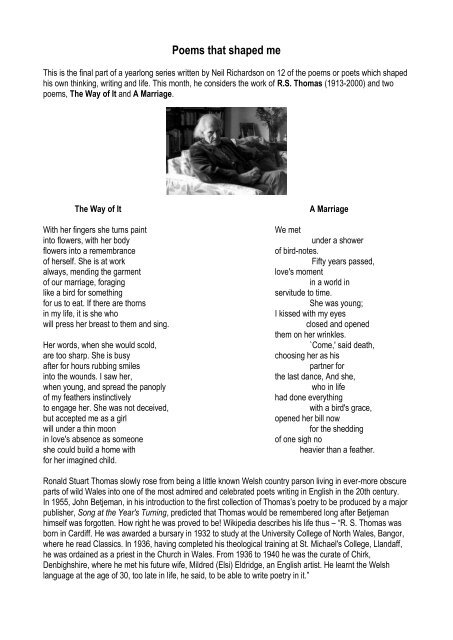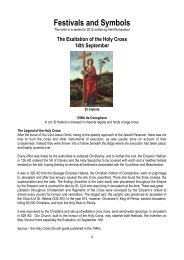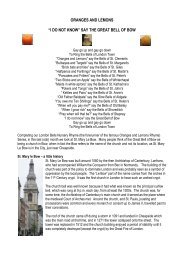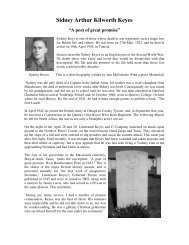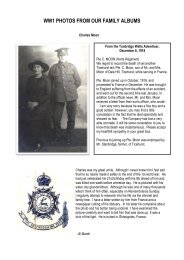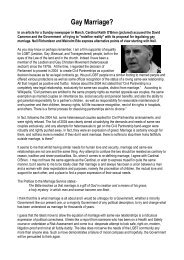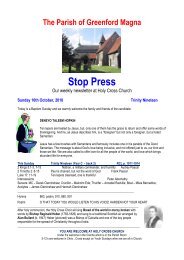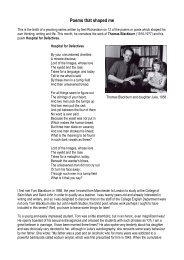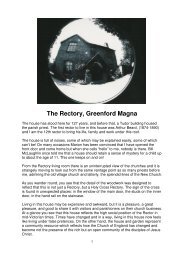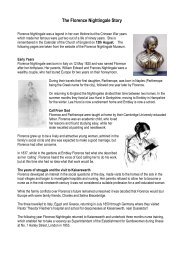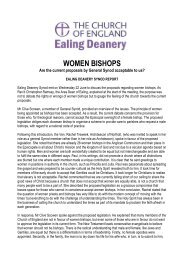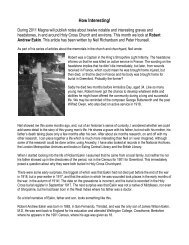Poems that shaped me - The Parish of Greenford Magna
Poems that shaped me - The Parish of Greenford Magna
Poems that shaped me - The Parish of Greenford Magna
Create successful ePaper yourself
Turn your PDF publications into a flip-book with our unique Google optimized e-Paper software.
<strong>Poems</strong> <strong>that</strong> <strong>shaped</strong> <strong>me</strong>This is the final part <strong>of</strong> a yearlong series written by Neil Richardson on 12 <strong>of</strong> the poems or poets which <strong>shaped</strong>his own thinking, writing and life. This month, he considers the work <strong>of</strong> R.S. Thomas (1913-2000) and twopoems, <strong>The</strong> Way <strong>of</strong> It and A Marriage.<strong>The</strong> Way <strong>of</strong> ItWith her fingers she turns paintinto flowers, with her bodyflowers into a re<strong>me</strong>mbrance<strong>of</strong> herself. She is at workalways, <strong>me</strong>nding the gar<strong>me</strong>nt<strong>of</strong> our marriage, foraginglike a bird for so<strong>me</strong>thingfor us to eat. If there are thornsin my life, it is she whowill press her breast to them and sing.Her words, when she would scold,are too sharp. She is busyafter for hours rubbing smilesinto the wounds. I saw her,when young, and spread the panoply<strong>of</strong> my feathers instinctivelyto engage her. She was not deceived,but accepted <strong>me</strong> as a girlwill under a thin moonin love's absence as so<strong>me</strong>oneshe could build a ho<strong>me</strong> withfor her imagined child.A MarriageWe <strong>me</strong>tunder a shower<strong>of</strong> bird-notes.Fifty years passed,love's mo<strong>me</strong>ntin a world inservitude to ti<strong>me</strong>.She was young;I kissed with my eyesclosed and openedthem on her wrinkles.`Co<strong>me</strong>,' said death,choosing her as hispartner forthe last dance, And she,who in lifehad done everythingwith a bird's grace,opened her bill nowfor the shedding<strong>of</strong> one sigh noheavier than a feather.Ronald Stuart Thomas slowly rose from being a little known Welsh country parson living in ever-more obscureparts <strong>of</strong> wild Wales into one <strong>of</strong> the most admired and celebrated poets writing in English in the 20th century.In 1955, John Betjeman, in his introduction to the first collection <strong>of</strong> Thomas’s poetry to be produced by a majorpublisher, Song at the Year's Turning, predicted <strong>that</strong> Thomas would be re<strong>me</strong>mbered long after Betjemanhimself was forgotten. How right he was proved to be! Wikipedia describes his life thus – “R. S. Thomas wasborn in Cardiff. He was awarded a bursary in 1932 to study at the University College <strong>of</strong> North Wales, Bangor,where he read Classics. In 1936, having completed his theological training at St. Michael's College, Llandaff,he was ordained as a priest in the Church in Wales. From 1936 to 1940 he was the curate <strong>of</strong> Chirk,Denbighshire, where he <strong>me</strong>t his future wife, Mildred (Elsi) Eldridge, an English artist. He learnt the Welshlanguage at the age <strong>of</strong> 30, too late in life, he said, to be able to write poetry in it.”
For so<strong>me</strong> ti<strong>me</strong> I have been in awe <strong>of</strong> R. S. Thomas. His work is just perfect and I believehe will one day be put in the top category <strong>of</strong> poets in English, right up there with MrShakespeare! Three years ago, I read a biography by Byron Rogers called <strong>The</strong> ManWho Went Into <strong>The</strong> West, <strong>The</strong> Life <strong>of</strong> R. S. Thomas. (London: Aurum Press, 2006).Reading the biography brought <strong>me</strong> face-to-face with the fact <strong>that</strong> Thomas was not reallya likable person and in so<strong>me</strong> ways, he was so<strong>me</strong>thing <strong>of</strong> a snob, carefully cultivating therich English people around him whilst blasting away about the “English” in his politicalranting. His working day consisted <strong>of</strong> writing and studying in the morning, hill walking and bird watching in theafternoon, and eating and socialising in the evening. It is also odd <strong>that</strong> nobody re<strong>me</strong>mbers his sermons asbeing particularly interesting or written in beautiful language. After learning Welsh, the day ca<strong>me</strong> for him topreach his first sermon in the new language. At the end, the congregation reflected <strong>that</strong> although they couldunderstand his Welsh, they still couldn’t understand the sermon! He was abrasive and unforgiving. In a poemcalled Unposted, he writes to a person who has sent him so<strong>me</strong> poems to read, perhaps for approval? Hisresponse is“I see why you wrote them,but why send them? Why notbury them, as a cat its faeces?”However, it is not necessary to be nice to be great! Thomas’s poetry is dominated by Wales, its people andlandscapes, its birds and wild life, and <strong>of</strong> course, God and the spirituality <strong>of</strong> his own journey. I have not chosenpoems to reflect these the<strong>me</strong>s, but two poems about his wife. <strong>The</strong>se poems are very revealing. In the poem<strong>The</strong> Way <strong>of</strong> It, Thomas reveals <strong>that</strong> his wife didn’t really love him, but married him as a second best option.Very sad, to live with <strong>that</strong> feeling all one’s married life! His sharp descriptions <strong>of</strong> Mildred in the first stanza aretypically R. S. Thomas, precise, pared down to the last syllable and totally convincing in so few words. He isaware <strong>that</strong> he is a pain to her, but comforted <strong>that</strong>If there are thornsin my life, it is she whowill press her breast to them and sing.He scolds her for her sharp tongue, but is thankful <strong>that</strong> she wants to heal any wounds she caused. <strong>The</strong> birdimage is just rightI saw her,when young, and spread the panoply<strong>of</strong> my feathers instinctivelyto engage her.<strong>The</strong> absence <strong>of</strong> love <strong>of</strong> which he speaks now beco<strong>me</strong>s a matter <strong>of</strong> practicality. She looked to him to providefor her and her as yet imagined child. Thomas seems to deal with the humiliation <strong>of</strong> this situation and despitehaving to put up with what really is second best, he surely loved her, as I think is very clear. It is the way <strong>of</strong> it.A Marriage is a poem which shocks and thrills. <strong>The</strong> genius <strong>of</strong> his language drives the reader on andbreathlessly, we see the whole <strong>of</strong> their married life in 22 short lines. How moving are the words,She was young;I kissed with my eyesclosed and openedthem on her wrinkles.As a man who has written over 50 poems about his wife, I feel sad about what these poems reveal for bothRonald and Mildred Thomas, the rather empty marriage landscape which is implicit. But selfishly, I feel moresaddened because I know <strong>that</strong> I could never write anything so beautiful and powerful, so delicate and yet sotough as these two short poems. I know a master at work when I see one. I hope you enjoyed the 2009 series.


